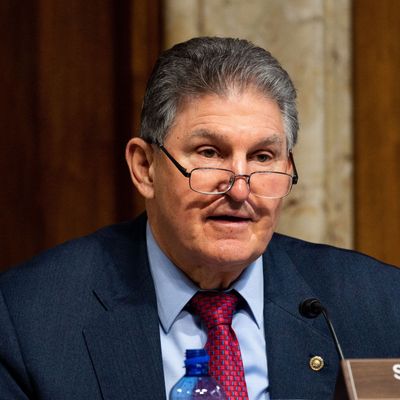
No subject in Washington has been more fraught this year: Will Senator Joe Manchin come around to the view of most of his Democratic colleagues that Republican obstruction of Joe Biden’s agenda require some modification of the filibuster?
There was never much of a chance that a total nuking of the filibuster would get the 50 Senate votes it would need (assuming Joe Biden would allow Vice-President Kamala Harris to break a tie in that direction). Aside from Manchin, Kyrsten Sinema of Arizona was adamantly against that proposition, and a few other “moderates” were shaky on it as well.
But hope abided that Manchin and other Democrats might go along with a subject-matter exception to the filibuster, principally for voting-rights legislation, particularly after he expressed some openness to modification of the rules to make filibusters more difficult. But now, in a Washington Post op-ed, the West Virginian seemed to say “no”:
I have said it before and will say it again to remove any shred of doubt: There is no circumstance in which I will vote to eliminate or weaken the filibuster. The time has come to end these political games, and to usher a new era of bipartisanship where we find common ground on the major policy debates facing our nation.
To illustrate what he meant by “weakening” the filibuster, Manchin noted his opposition to the two big subject-matter exceptions the Senate has enacted in recent years: the Democrat-supported exception for executive and most judicial confirmations in 2013, and the Republican-supported exception for Supreme Court confirmations in 2017. If he still considers those steps excessive limitations on minority prerogatives in the Senate, it’s hard to imagine him backing an exception for voting-rights measures. Indeed, in the same op-ed, Manchin expresses confidence in the willingness of senators from both parties to come together on voting rights, which is a bizarre assessment of the situation, since nearly all Republican oppose any limitation on state voter-suppression measures.
HuffPost’s Arthur Delaney brought up something Manchin said last month that makes him sound truly incorrigible on voting rights: “The only thing I would caution anybody and everybody about is that we had an insurrection on January 6, because of voting, right? And lack of trust in voting? We should not, at all, attempt to do anything that would create more distrust and division.”
So bipartisanship on voting rights, it would seem, depends on restoring the “trust” of conspiracy-theory-fed MAGA insurrectionists that no one will “steal” future elections from their candidates. Thanks a lot, Joe; that’s very constructive.
Manchin’s op-ed actually contained something more ominous for Democrats than toughening his line of defense for the filibuster: a warning to Chuck Schumer about the use of budget reconciliation measures to circumvent the filibuster:
We should all be alarmed at how the budget reconciliation process is being used by both parties to stifle debate around the major issues facing our country today …
I simply do not believe budget reconciliation should replace regular order in the Senate.
This remark was almost certainly motivated by the recent decision of the Senate parliamentarian to green-light multiple fiscal-year budget resolutions and reconciliation bills, as Schumer had advocated. Manchin is reminding Schumer and his colleagues that reconciliation could be useless if he comes to consider its use excessive.
In this, as in other oracular Manchin pronouncements, Democratic optimists can see a ray of light: Even as he lashes his party for being willing to pass partisan legislation, he tells Senate Republicans they “have a responsibility to stop saying no, and participate in finding real compromise with Democrats,” as though their behavior over the last 12 years suggests they are open to anything other than obstruction. In theory, Manchin can eventually profess himself exasperated with the GOP and change his position on both the filibuster and on reconciliation. As Ron Brownstein and others have argued, forcing voting-rights legislation through Congress may prove essential to the preservation of Democratic power in Washington and in the states, a matter of concern even to “moderate” Democrats. But the fact remains that this Joe may prove more committed than the Joe in the White House to an old-school view of Senate traditions, if only because he represents a deep-red state. If he’s playing a long game that will eventually give his party a crucial win, he’s sure hiding his hand.






























